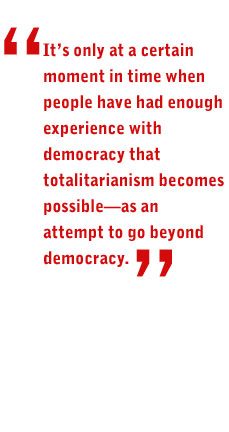


Seeds of Tyranny
by Philip Lee Williams
Intro
|
Alike But Different
|
Embraced By the People
|
Beyond Democracy
|
Cautious Optimism

![]()
A Distinguished Career in Brief

Alike But Different
One problem in understanding the Germany, Italy and Soviet Union of the recent past is that so many people have lumped them together as totalitarian states while ignoring their ample differences and the unique historical contexts that led to each of them. And while most people continue to rate Germany as the “worst” of the fascist states because of the enduring specter of the Holocaust, Roberts argues that such rankings miss the point.
“It’s obvious that something went horribly wrong in these regimes,” he says. “The first step in preventing such evil in the future is understanding where it came from in the first place. We need a deeper look.”

Benito Mussolini addressing a crowd in Pistoia, Italy.
Roberts’s latest book, The Totalitarian Experiment in Twentieth-Century Europe: Understanding the Poverty of Great Politics, is the deeper look of which he speaks. His colleagues in Europe and the United States have heaped high praise on the volume and its comparative analysis of what those regimes had in common and how they differed. In short, the issue isn’t whether, in the West, we might get another Adolf Hitler, says Roberts. It “is whether the conditions of possibility have been eliminated.”
If totalitarian governments should exist in the future—say, in Africa or Asia—the structure of those regimes would likely be quite different from the ones in Germany, Italy and the Soviet Union. As Roberts has learned from his research, totalitarianism appears to rest, ironically, on a prior experience of liberal democracy—something a great many states on those continents have never had before.
And just how our knowledge of historical totalitarianism might relate to current problems in Iraq and Iran is also unclear, because religion is so intertwined with government there. “Totalitarianism has come out of a secular society in every case,” Roberts says. “The dynamic would be quite different for religious states.”
Intro
|
Alike But Different
|
Embraced By the People
|
Beyond Democracy
|
Cautious Optimism
For comments or for information please e-mail: rcomm@uga.edu
To contact the webmaster please email: ovprweb@uga.edu
![]()